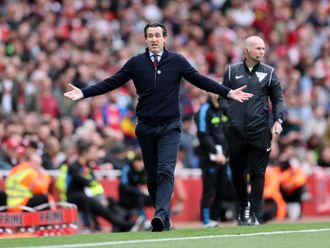Dubai: If you were to rank European leagues based on the number of their clubs that have made the Uefa Champions League quarter-finals over the past 10 seasons, the Premier League would have fallen from top after the first five seasons of the decade to fourth after the last five seasons.
From 2007/08 to 2011/12 England had a total 14 teams reach the last eight of the Champions League, more so than any other league, and six more than next placed La Liga of Spain.
England also had two winners within that period, Manchester United (2008) and Chelsea (2012), while a total five English sides reached the final.
In the last five seasons from 2012/13 to 2016/17 however, England has only had four sides reach the quarters, ranking them fourth behind Spain, Germany and France — in a percentage decrease of 70 per cent on the first five seasons.
No English sides have reached the final in that period. This year, only Leicester City are still in the quarters draw, after Manchester City, Arsenal and Tottenham Hotspur were all eliminated.
Over the past five seasons, the best English clubs have done is register two semi-final appearances, six down on the first five seasons of the decade, where they had eight semi-final entries (five of whom went through to the final, two of whom won).
The last half of the decade also saw two occasions in 2012/13 and 2014/15 when no English sides appeared in the last eight at all. It was the first time this had happened in 17 years since 1995/96.
Overall though, looking at the past 10 seasons combined, the Premier League is still second behind La Liga with a total 18 quarter-final appearances to Spain’s 24.
And on Champions League wins over the past 10 seasons, Spain are also top with five titles, and England are second on two, while both Germany and Italy share one apiece.
So overall, the Premier League is still right up there, but based on its rapid decline in Europe over the past five seasons there is reason for worry.
It might be the best league in the world in terms of marketing and exposure, and you can’t accuse it of being a two-horse race like Spain and Germany, because anyone can beat anyone, but when it comes to the crunch of Champions League football, all of the above counts for nothing.
This can only mean the actual quality of football in England is dipping, or the English style of play, although successful domestically and entertaining as a brand, just doesn’t weigh up in Europe, where skill and finesse perhaps trumps speed and physicality.
There’s also the argument that the Premier League is the only major league that doesn’t have a winter break, perhaps tiring players when it comes to the business end of the Champions League. However, that argument doesn’t hold weight when you consider there was also no winter break in the first half of the decade, when English clubs did so well.
Perhaps the most telling thing that occurred between the two halves of the decade was Sir Alex Ferguson’s retirement as manager of Manchester United after 27 years in 2013. There’s no question that his departure not only sent England’s most dominant side into decline, but the power vacuum also affected other Premier League clubs.
Without a pacemaker or target like United to beat, other clubs have become complacent, unfocused and inconsistent, to the extent where the top four clubs couldn’t put a run together last season, allowing the likes of perennial relegation fodder like Leicester to become shock champions.
In fact, since United last won the league under Fergie in 2013, no Premier League winning side has been able to surpass their points tally that season of 89. The winning points benchmark has decreased every year since, showing that standards have dropped, and the lack of English teams cutting it in Europe is where this decline is most obvious.











